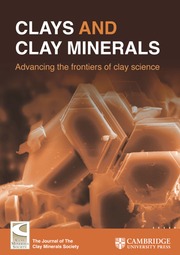Crossref Citations
This article has been cited by the following publications. This list is generated based on data provided by
Crossref.
Decarreau, A.
and
Bonnin, D.
1986.
Synthesis and crystallogenesis at low temperature of Fe(III)-smectites by evolution of coprecipitated gels: experiments in partially reducing conditions.
Clay Minerals,
Vol. 21,
Issue. 5,
p.
861.
Nitta, Yuriko
Ueno, Kenji
and
Imanaka, Toshinobu
1989.
Selective hydrogenation of αβ-unsaturated aldehydes on cobaltsilica catalysts obtained from cobalt chrysotile.
Applied Catalysis,
Vol. 56,
Issue. 1,
p.
9.
Aróstegui, J.
Zuluaga, M. C.
Velasco, F.
Ortega-Huertas, M.
and
Nieto, F.
1991.
Diagenesis of the Central Basque-Cantabrian Basin (Iberian Peninsula) based on illite-smectite distribution.
Clay Minerals,
Vol. 26,
Issue. 4,
p.
535.
Charlet, Laurent
and
Manceau, Alain
1994.
Evidence for the neoformation of clays upon sorption of Co(II) and Ni(II) on silicates.
Geochimica et Cosmochimica Acta,
Vol. 58,
Issue. 11,
p.
2577.
Vidal, Olivier
Magonthier, Marie-Claude
Joanny, Véronique
and
Creach, Monique
1995.
Partitioning of La between solid and solution during the ageing of SiAlFeLaCa gels under simulated near-field conditions of nuclear waste disposal.
Applied Geochemistry,
Vol. 10,
Issue. 3,
p.
269.
Xiang, Yan
and
Villemure, Gilles
1996.
Electrodes Modified with Synthetic Clay Minerals: Electrochemistry of Cobalt Smectites.
Clays and Clay Minerals,
Vol. 44,
Issue. 4,
p.
515.
Xiang, Yan
and
Villemure, Gilles
1996.
Electrodes Modified with Synthetic Clay Minerals: Electron Transfer between Adsorbed Tris(2,2‘-bipyridyl) Metal Cations and Electroactive Cobalt Centers in Synthetic Smectites.
The Journal of Physical Chemistry,
Vol. 100,
Issue. 17,
p.
7143.
Kloprogge, J. Theo
Komarneni, Sridhar
and
Amonette, James E.
1999.
Synthesis of Smectite Clay Minerals: A Critical Review.
Clays and Clay Minerals,
Vol. 47,
Issue. 5,
p.
529.
Higashi, Shoji
Miki, Kazuhiko
and
Komarneni, Sridhar
2002.
Hydrothermal Synthesis of Zn-Smectites.
Clays and Clay Minerals,
Vol. 50,
Issue. 3,
p.
299.
Villemure, Gilles
2002.
Electrochemical Properties of Clays.
p.
149.
Higashi, Shoji
Miki, Hitomi
and
Komarneni, Sridhar
2007.
Mn-smectites: Hydrothermal synthesis and characterization.
Applied Clay Science,
Vol. 38,
Issue. 1-2,
p.
104.
Trujillano, Raquel
Lambert, Jean-François
and
Louis, Catherine
2008.
Chemistry of Silica-Supported Cobalt Catalysts Prepared by Cation Adsorption. 2. Neoformation of Cobalt Phyllosilicate.
The Journal of Physical Chemistry C,
Vol. 112,
Issue. 47,
p.
18551.
Scott, Bradley
Crouse, Jeff
Correia, Maria
Sun, Laisheng
and
Villemure, Gilles
2010.
Preparation of well-ordered hexagonal particles of synthetic cobalt smectites containing electrochemically active cobalt(II) sites.
Applied Clay Science,
Vol. 48,
Issue. 1-2,
p.
46.
Domínguez, Montserrat
Taboada, Elena
Idriss, Hicham
Molins, Elies
and
Llorca, Jordi
2010.
Fast and efficient hydrogen generation catalyzed by cobalt talc nanolayers dispersed in silica aerogel.
Journal of Materials Chemistry,
Vol. 20,
Issue. 23,
p.
4875.
Gao, Shuai
Zhao, Jiachang
Zhao, Yu
Wu, Yuandong
Zhang, Xiaozhu
Wang, Linlin
Liu, Xijian
Rui, Yichuan
and
Xu, Jingli
2015.
Na2CoSiO4 as a novel positive electrode material for sodium-ion capacitors.
Materials Letters,
Vol. 158,
Issue. ,
p.
300.
Yue, Chaochao
Liu, Chong
Mezari, Brahim
Brückner, Angelika
Pidko, Evgeny A.
Rigutto, Marcello S.
and
Hensen, Emiel J.M.
2016.
The nature of strong Brønsted acidity of Ni-SMM clay.
Applied Catalysis B: Environmental,
Vol. 191,
Issue. ,
p.
62.
Kloprogge, J.T.
2017.
Infrared and Raman Spectroscopies of Clay Minerals.
Vol. 8,
Issue. ,
p.
222.
2017.
Infrared and Raman Spectroscopies of Clay Minerals.
Vol. 8,
Issue. ,
p.
515.
Wolf, Moritz
Gibson, Emma K.
Olivier, Ezra J.
Neethling, Jan H.
Catlow, C. Richard A.
Fischer, Nico
and
Claeys, Michael
2019.
Water-Induced Formation of Cobalt-Support Compounds under Simulated High Conversion Fischer–Tropsch Environment.
ACS Catalysis,
Vol. 9,
Issue. 6,
p.
4902.
Baldermann, Andre
Landler, Andreas
Mittermayr, Florian
Letofsky-Papst, Ilse
Steindl, Florian
Galan, Isabel
and
Dietzel, Martin
2019.
Removal of heavy metals (Co, Cr, and Zn) during calcium–aluminium–silicate–hydrate and trioctahedral smectite formation.
Journal of Materials Science,
Vol. 54,
Issue. 13,
p.
9331.


